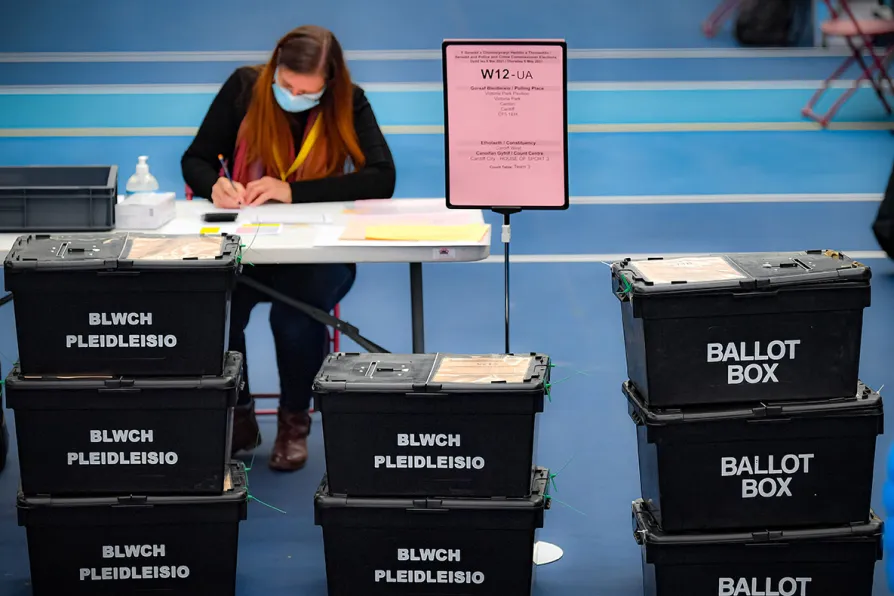
 Ballot boxes arrive for votes for the Welsh Parliamentary Elections at the Cardiff House of Sport, Cardiff, May 7, 2021
Ballot boxes arrive for votes for the Welsh Parliamentary Elections at the Cardiff House of Sport, Cardiff, May 7, 2021
CAN electoral reform beat Reform? The all-party parliamentary group for fair elections calls for a commission to address Britain’s unfair voting system, noting that first past the post (FPTP) now risks handing sweeping majorities to parties with an ever-smaller share of the vote.
This has traditionally benefited the big two, so neither the Tories nor Labour have wanted to address it. Currently, Keir Starmer owes his huge majority to the distorted result produced by FPTP, with Labour holding 63 per cent of the seats in the Commons on less than 34 per cent of the vote.
Reform UK’s advance risks turning this on its head. The voting system has long counted against it, leaving it with just five seats last year despite winning over four million votes because it ran Labour or the Tories second in so many places. As the recent collapse of true-blue Kent and Red Wall County Durham to the party showed, it now often has a narrow lead over its rivals, which at a general election could translate to a landslide victory.
The all-party group is right both that FPTP produces unfair results and that, with the electorate fragmenting, the governments it produces are seen as increasingly illegitimate.
Two caveats should be added, however.
One — as Gordon Brown observed in proposals for constitutional reform made in 2022, which Labour welcomed at the time and has ignored since — the real reason confidence in the political system is collapsing is its failure to deliver for ordinary people economically. Inequality, worsening public services and falling living standards drive public resentment.
Two — a movement for democratic reform will only take off if it is about transforming, not shoring up, the status quo. If the agenda is perceived to be shutting out Reform by facilitating grand coalitions of the so-called centrist parties, it will only increase the sense that politics is an Establishment fix.
We have seen such coalitions in Germany, and the more proportional voting system there has not stopped the rise of the far right nor deep alienation from the political system. Indeed, the coalition-building process there has blunted the radicalism of originally insurgent parties, drawing them into collaboration with an unpopular status quo through the lure of “seats at the table.”
Proportional representation (PR) is no panacea: it does not address the basic reason Western political systems do not work for the majority, which is the state power of the capitalist class.
Bearing that in mind, there is a strong case for a movement for democratic reform conceived on a more ambitious basis.
As with Brown’s proposals, this should involve decentralisation. Local government has been hollowed out, politically and financially. Abolition of the regressive council tax system, which falls most heavily on poorer households, and its replacement by progressive property taxes would allow councils to raise more money independently of central government, giving them greater freedom and breathing life into moribund local democracy.
As Brown also urged, it should involve abolition of the House of Lords. This cronies’ assembly, granting legislative power for life in return for political and financial favours, showcases the corruption and privilege that dominate our politics. Replacing it with an assembly of nations and regions is long overdue.
MPs could also take a leaf out of Jeremy Corbyn’s book, with the “people’s forums” in his constituency a way to bring citizens together to shape local politics.
The all-party group is right to want electoral reform, but for the left the question of democracy is wider: it encompasses free speech and protest rights, accountability at all levels of government and a revival of community politics involving trade unions.
A movement for a more democratic Britain does have the potential to expose and isolate the likes of Reform UK: but if it doesn’t confront our increasingly authoritarian and unaccountable state, it is unlikely to engage a disaffected public.

With Reform UK surging and Labour determined not to offer anything different from the status quo, a clear opportunity opens for the left, argues CLAUDIA WEBBE












